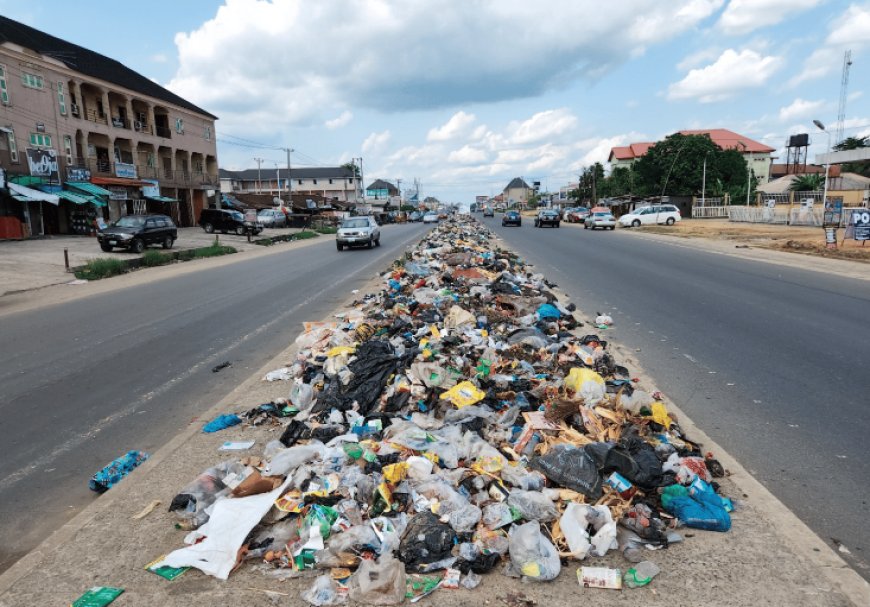Special report: Waste Management Crisis in Lagos

Lagos State, with an estimated population exceeding 20 million, is Nigeria's most populous state and one of the fastest-growing urban agglomerations in the world.
The city’s rapid urbanization has outpaced the development of essential infrastructure, particularly in waste management and sanitation. Rural communities, often neglected in the distribution of resources and services, bear the brunt of this infrastructural deficit.
The interplay of rapid urbanization, inadequate infrastructure, and poor waste management practices has created a public health crisis. Residents are increasingly exposed to health hazards due to the city's waste management challenges.
As the city expands and its population swells, the consequences of poor waste management practices have become increasingly dire, posing significant threats to public health and environmental sustainability. Despite various governmental and non-governmental efforts to address these challenges, the realities on ground paint a stark picture. Open dumpsites, improper waste disposal habits, amongst others have become common sights across different areas of Lagos.
Lagos, with its dense population and fast-paced growth, produces an enormous amount of waste daily. The Lagos Waste Management Authority (LAWMA) struggles to cope with the volume of waste which according to a report by the Nigerian Institute of Town Planners (NITP), Lagos produces between 13,000 and 15,000 metric tonnes of waste daily, equivalent to about 490 trailer loads and each resident of Lagos generates an average of 1.2 kilograms of waste per day, a figure projected to increase to 1.4 kilograms per day over the next 15 years. Many residents, particularly in rural communities, resort to improper waste disposal methods, including open defecation and the use of informal waste collectors .
The root causes of these challenges are diverse; encompassing inadequate infrastructure, lack of awareness, and insufficient regulatory enforcement. The existing waste management systems in Lagos are overwhelmed and under-resourced, failing to keep pace with the city's rapid growth. Many residents, particularly in rural areas and urban poor, lack access to basic sanitation facilities and proper waste disposal methods. Additionally, there is a significant gap in public awareness regarding the hazards posed by improper waste and sewage disposal.
Waste management in Lagos is handled by the Lagos Waste Management Authority (LAWMA), which struggles to cope with the sheer volume of waste generated daily. LAWMA's capacity to collect and properly dispose waste is limited, as many residents prefer to dispose waste in open spaces or patronize waste collectors who move with sac bags and wheel barrow across the streets, resulting in significant amounts of waste being discarded indiscriminately.
According to NITP, residents in developing countries, especially the urban poor, are more severely impacted by plastic waste often through disposal in unregulated dumps or by burning. They emphasized that these practices create serious health, safety, and environmental consequences including respiratory issues due to air pollution from burning plastic; shortened animal lifespans arising from plastic consumption; clogging of drains triggering flooding and contamination of precious oceans and waterways.
Open Dumpsites, Landfills and Health Hazards
In a visit by our reporter to several parts of Lagos Mainland, residents struggle with the consequences of poor waste management and indiscriminate waste and sewage disposal habits. Open dumpsites are a common sight, with waste piled high and left to rot, waste disposed around walkway and streets, waste dumped in drainage and canal. The stench from these waste permeates the air, and flies and rodents are constant nuisances.

Olusosun Landfill entrance with waste pickers and other waste scavengers with garbage trucks loaded to move out in Olusosun, Lagos State, Nigeria.
To further examine the reality of the situation, our reporter visited some areas with open waste dump sites created by residents due to indiscriminate disposal habits, as well as the Olusosun Landfill, which is reputed to be the largest in Nigeria and Africa. Research indicates that the Olusosun Landfill spans across 100 acres.
The situation poses not only environmental issues, the stench poses serious health problems to residents as the site is now surrounded by commercial and residential areas. Areas like Ojota, Ogudu, Alausa, Oregun, Iyana Ikosi, Opebi, residents have a handful of these challenges due to the proximity to the landfill.
The Olusosun landfill is a Lagos state government regulated dumpsite under the Lagos Waste Management Authority (LAWMA). According to information gathered by our reporter from waste pickers, they shared that access to the dumpsite is not restricted, as waste pickers can go in and look for recyclable materials that can be resold, but would first register. The landfill, which is one of the largest in Africa, has been a focal point of these issues. Residents living near these dumpsites are exposed to a continuous stream of pollutants that can lead to chronic health conditions.
The landfill is a haven for both women and children scavenging through the waste. They have constructed makeshift huts from sacks and small pieces of wood, living amidst the filth and squalor. Most waste pickers do not use nose masks or gloves, and many handle the waste with their bare hands. The recent rainfall exacerbated the situation, leaving the area in an even more deplorable state. Despite these conditions, food vendors operate within the dump site, selling cooked meals and boiled groundnuts.
The risks are even greater for child waste pickers, who are at constant risk of being pricked by sharp objects such as syringes, needles, surgical blades, and broken bottles. Despite these hazards, the children continue to work at the landfill due to chronic poverty. Many of these children come from families where waste picking is the primary source of income. They often hail from areas lacking basic amenities like potable water, sanitation facilities, and proper healthcare services.
Children at the landfill manually sort through waste without any protective equipment such as gloves or face masks. They work in an unsheltered environment, exposed to harsh conditions like rain, intense heat, and cold weather. These conditions can lead to various health issues, including gastrointestinal illnesses, skin diseases, insect bites, and regular headaches.
Child waste pickers were also at risk of being pricked by sharp objects such as syringes, needles, surgical blades and broken bottles. Despite all these hazards, the children continued working at the landfill because of chronic poverty. Some of the children’s parents were waste pickers themselves.
Waste Crisis and Public Health Risks
Mr. Olalekan Timeyin, an Environmental Health Expert, highlighted the significant risks associated with the waste crisis and its impact on public health during an interview. "Open dumpsites produce obnoxious odors in and around the environment," Mr. Timeyin stated. "People living near these sites will not be able to perceive clean and quality air, which would likely affect their respiratory systems."
He further explained the dangers of leachate, a harmful waste byproduct. "Leachate is a kind of waste that is not good for the earth. When it rains, the rainfall can carry that leachate to nearby water bodies, such as rivers. Once leachate contaminates a water body, people living nearby who use that water for drinking will be at risk of health issues. It can result in diseases," he warned.
Mr. Timeyin also highlighted the adverse effects of landfill sites on soil quality. "Landfills can affect the soil, causing it to lose its quality and nutrients over time. This degradation indirectly affects people because once the soil loses its quality, it becomes difficult to plant and harvest crops. This presents a significant challenge for people living in those areas, affecting land use and agricultural productivity."

Open dumpsite where residents dump waste in front of shops and allow to rotten in Alapere, Lagos State, Nigeria.
Nurse and Paramedic Expert Bukola Christiana Okusanya shared crucial insights into the health and environmental risks posed by open dumps and landfill sites. She highlighted several key issues affecting individuals living near these areas.
"Improper handling of solid waste can release harmful chemicals into the air, contaminate water supplies, and create hazardous illegal waste sites. This can have numerous health effects, including low birth weight, birth defects, and certain types of cancers," she stated. "While biases and confounding factors cannot be excluded as explanations for these findings, they may indicate real risks."
"Open dumps can cause soil and water contamination, leading to various health issues such as malaria, cholera, skin infections, cancer, tuberculosis, reoccurring flu, influenza, asthma, and respiratory problems among individuals living nearby landfill sites," Okusanya explained. "Inhaling gases released from landfills, such as sulfur dioxide (SO2) and nitrogen dioxide (NO2), can result in throat and nose irritations that could potentially cause asthma."
She highlighted the long-term dangers of toxic waste, noting, "Toxic waste can harm people, animals, and plants, whether it ends up in the ground, in streams, or even in the air. Some toxins, such as mercury and lead, persist in the environment for many years and accumulate over time. Humans or wildlife often absorb these toxic substances when they eat fish or other prey."
Okusanya stressed the broader environmental implications of landfill gases. "Landfills produce methane, carbon dioxide, water vapor, and trace amounts of oxygen, nitrogen, hydrogen, and non-methane organic compounds. These gases can contribute to climate change and create smog if left uncontrolled."
"Open dumps also contribute to oceanic pollution," Okusanya added. "Increases in adverse health effects have been reported near individual landfill sites and in some multisite studies, indicating the potential risks associated with these waste management practices."
Garbage Truck Drivers and Street Sweepers Shares their Concerns
Some garbage truck drivers at the Olusosun landfill shared their burdens and concerns, highlighting the difficulties they encounter in waste collection across Lagos. The drivers emphasized poor disposal habits among residents which further exacerbate their challenges.
Improperly disposed waste often complicates the collection process, making it more time-consuming and hazardous. Waste segregation is another major issue highlighted. People don't separate their waste properly, they end up with a mix of recyclable and non-recyclable materials, which complicates the collection process and makes recycling almost impossible.
Navigating through Lagos traffic is another daily nightmare they lamented. Often get stuck for hours, which delays their schedules and increases fuel costs. For many streets, whose roads are in poor condition, and there are very few proper waste collection points. It makes their job extremely difficult, especially when we have to maneuver through pothole and mud in raining season.
The attitude of the public also affects their work. "Some residents are uncooperative," added Mr. Bolatito Sesan. "They dispose waste improperly, which scatters all over the place. It’s disheartening to see our efforts being undermined by careless disposal habits." Improper disposal of plastics and other non-biodegradable materials leads to pollution, contaminating water sources and harming the environment.

Similar sentiments were echoed by women who are street sweepers employed by the Lagos Waste Management Authority (LAWMA). The lack of proper waste segregation by residents also impacts their work. "People throw all kinds of waste on the streets without any consideration," said by one of the women at Alapere Estate. "Some residents don't respect our work, they litter even when we're right there cleaning. It's frustrating and demoralizing" she added.
Health risks are a significant concern for street sweepers as well. "We are exposed to dust, smoke, and hazardous waste every day, without proper protective gear, many of us suffer from some health issues and other health problems” they shared. “We breathe in a lot of dust and smoke from cars, which affects our health over time."
Environmental concerns were also raised. Improper waste disposal leads to blocked drainages leading to flooding during the rainy season. This not only affects these women but also the entire community. Resource shortages are a shared concern. "We lack adequate tools and protective gear. Sometimes, we have to make do with old brooms and worn-out gloves, which makes our job harder and exposes us to health risks. Without proper equipment, it's challenging to clean effectively and safely" they explained
Government Intervention and Regulatory Framework
The Lagos State Government has made some strides in this regard, with initiatives aimed at improving waste management infrastructure and promoting environmental sustainability. For instance, the Cleaner Lagos Initiative (CLI) was launched to overhaul the waste management system, increase waste collection efficiency, and reduce environmental pollution.
Despite existing interventions, environmental laws and regulations, the problem of waste management in Lagos is compounded by different challenges including insufficient regulatory enforcement, which has allowed harmful practices to persist and escalate. The lack of stringent enforcement mechanisms and accountability has led to widespread deterioration of public health.
The lack of adequate infrastructure for waste collection and treatment is a significant barrier to effective waste management. In many parts of Lagos, waste collection services are inconsistent. This forces residents to resort to illegal dumping and unsafe waste disposal practices. A situation which calls for urgent and effective action to strengthen regulatory frameworks and ensure compliance.
An announcement to decommission dumpsites was made recently by Tokunbo Wahab, the Honourable Commissioner, Ministry of the Environment and Water Resources, Lagos State, during the Commissioner’s remarks at the close of the Lagos CLEAN-Air Forum 2024, organized by AirQo (CLEAN-Air Network), at the Lagos Continental hotel, underscoring the global urgency to address the challenges. In his words, he said “For the dump sites, we agreed at the government that we have to decommission the Olusosun dumpsites and we have to do it within the next 18 months.”
Wahab highlighted the exponential growth of Lagos, which has intensified pollution concerns, particularly from improperly managed waste. He said: “And for those who don’t know, Lagos, as it stands, was created in 1967 with a population of 1.2 million people. By 1980, it has grown to 2.5 million people. By year 2000, it has grown to 7.5 million people. And today we have over 22 to 24 million people staying in Lagos. And then, the size, the land size of Lagos is just 3,507 square kilometers of land. And then housing 22 million people. Just close your eyes and imagine the humongous pollution that will go on in this space” he highlighted.
Lagos has a number of environmental laws aimed at managing waste and protecting water resources. These include the Lagos State Environmental Protection Agency (LASEPA) laws and regulations under the Lagos Waste Management Authority (LAWMA). However, these frameworks often suffer from implementation challenges, including inadequate funding, lack of trained personnel, bureaucratic inefficiencies and little or no punishment of offenders who dispose waste indiscriminately.
"We simply do not have enough waste treatment facilities to handle the volume of waste generated by the city. The infrastructure is outdated, and the funding to improve it is insufficient. I remember that time when Ambode was the governor and he wanted to do partnership with private people to recycle and treat waste. They built office in Ogudu, I think another one too if you are going to Lagos Island, but now that he is not the governor again, everything is dead" admits Mr. Chukwuma Udo, a resident in Alausa, Ikeja.
"We often see waste management trucks dumping refuse in unauthorized areas, you would see these trucks always parked close to canals especially in the evening, and there seems to be no repercussions. It's as if the rules don't apply to them," says Mrs. Eniola Abbas, a resident of Alapere. Her observation points to the systemic corruption that hampers effective regulatory enforcement.
The success of regulatory enforcement is also hindered by a lack of public awareness and education on proper waste disposal practices. Many residents are unaware of the health and environmental risks associated with indiscriminate waste disposal, leading to continued harmful practices. For Mrs. Folake Ojo, a trader at Mile 12 market, she highlighted the importance of grassroots involvement in driving policy changes "We advocate for better policies and work with authorities to improve sanitation facilities. It’s a slow process, but community involvement is crucial for sustainable change," she said.
Way Forward
"Education is key. If people understood the impact of their actions on the environment and public health, they might be more inclined to follow the rules. Schools and community programs should play a bigger role in spreading this knowledge," suggests Mrs. Blessing Olabisi, a school teacher in Lagos. Public education campaigns are essential to raise awareness about the health and environmental risks of improper waste disposal.
Encouraging waste segregation at the source and enhancing recycling initiatives can reduce the volume of waste ending up in landfills. This not only mitigates the risk of leachate formation but also promotes a circular economy. Public awareness campaigns and community engagement are essential to foster responsible waste disposal practices. Educating residents about the environmental and health risks associated with improper waste management can drive behavioral change and community action.
Non-governmental organizations and community groups play a crucial role in raising awareness and driving behavioural change. Public education campaigns should emphasize the health risks associated with improper waste disposal and encourage communities to adopt safer practices. International support and collaboration are also vital. Global partnerships can provide the technical expertise, financial resources, and policy frameworks needed to address the complex challenges of waste and sewage management.
Investing in modern landfill technologies, such as engineered liners and leachate collection systems, can significantly reduce the risk of contamination. Properly designed landfills can contain waste and prevent toxic leachate from seeping into water bodies. Robust environmental regulations and strict enforcement are crucial to ensure that waste management practices adhere to safety standards. This includes regular monitoring of landfill sites and penalizing non-compliance.
Source: Collins Odigie Ojiehanor/Lagos

























































